Fleurs du Mal Magazine


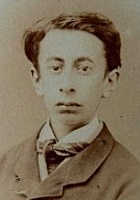
Tristan Corbière
Feminin singulier
Éternel Féminin de l’éternel Jocrisse!
Fais-nous sauter, pantins nous payons les décors!
Nous éclairons la rampe…. Et toi, dans la coulisse,
Tu peux faire au pompier le pur don de ton corps.
Fais claquer sur nos dos le fouet de ton caprice,
Couronne tes genoux!… et nos têtes dix-cors;
Ris! montre tes dents! mais … nous avons la police,
Et quelque chose en nous d’eunuque et de recors.
… Ah tu ne comprends pas?…–Moi non plus–Fais la belle
Tourne: nous sommes soûls! Et plats: Fais la cruelle!
Cravache ton pacha, ton humble serviteur!…
Après, sache tomber!–mais tomber avec grâce–
Sur notre sable fin ne laisse pas de trace!…
–C’est le métier de femme et de gladiateur.–
Tristan Corbière (1845 – 1875)
Feminin singulier
fleursdumal.nl magazine
More in: *Archive Les Poètes Maudits, Archive C-D, Corbière, Tristan
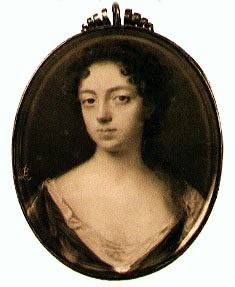
Anne Finch
To A Husband
This is to the crown and blessing of my life,
The much loved husband of a happy wife;
To him whose constant passion found the art
To win a stubborn and ungrateful heart,
And to the world by tenderest proof discovers
They err, who say that husbands can’t be lovers.
With such return of passion, as is due,
Daphnis I love, Daphinis my thoughts pursue;
Daphnis, my hopes and joys are bounded all in you.
Even I, for Daphnis’ and my promise’ sake,
What I in woman censure, undertake.
But this from love, not vanity proceeds;
You know who writes, and I who ’tis that reads.
Judge not my passion by my want of skill:
Many love well, though they express it ill;
And I your censure could with pleasure bear,
Would you but soon return, and speak it here.
Anne Finch (1661 – 1720)
To A Husband
fleursdumal.nl magazine
More in: Archive E-F, CLASSIC POETRY

Samuel Taylor Coleridge
Xanadu – Kubla Khan
In Xanadu did Kubla Khan
A stately pleasure-dome decree:
Where Alph, the sacred river, ran
Through caverns measureless to man
Down to a sunless sea.
So twice five miles of fertile ground
With walls and towers were girdled round:
And there were gardens bright with sinuous rills,
Where blossomed many an incense-bearing tree;
And here were forests ancient as the hills,
Enfolding sunny spots of greenery.
But oh! that deep romantic chasm which slanted
Down the green hill athwart a cedarn cover!
A savage place! as holy and enchanted
As e’er beneath a waning moon was haunted
By woman wailing for her demon-lover!
And from this chasm, with ceaseless turmoil seething,
As if this earth in fast thick pants were breathing,
A mighty fountain momently was forced:
Amid whose swift half-intermitted burst
Huge fragments vaulted like rebounding hail,
Or chaffy grain beneath the thresher’s flail:
And ‘mid these dancing rocks at once and ever
It flung up momently the sacred river.
Five miles meandering with a mazy motion
Through wood and dale the sacred river ran,
Then reached the caverns measureless to man,
And sank in tumult to a lifeless ocean:
And ‘mid this tumult Kubla heard from far
Ancestral voices prophesying war!
The shadow of the dome of pleasure
Floated midway on the waves;
Where was heard the mingled measure
From the fountain and the caves.
It was a miracle of rare device,
A sunny pleasure-dome with caves of ice!
A damsel with a dulcimer
In a vision once I saw:
It was an Abyssinian maid,
And on her dulcimer she played,
Singing of Mount Abora.
Could I revive within me
Her symphony and song,
To such a deep delight ‘twould win me
That with music loud and long
I would build that dome in air,
That sunny dome! those caves of ice!
And all who heard should see them there,
And all should cry, Beware! Beware!
His flashing eyes, his floating hair!
Weave a circle round him thrice,
And close your eyes with holy dread,
For he on honey-dew hath fed
And drunk the milk of Paradise.
Samuel Taylor Coleridge (1772 – 1834)
Xanadu – Kubla Khan
fleursdumal.nl magazine
More in: Archive C-D, Coleridge, Coleridge, Samuel Taylor
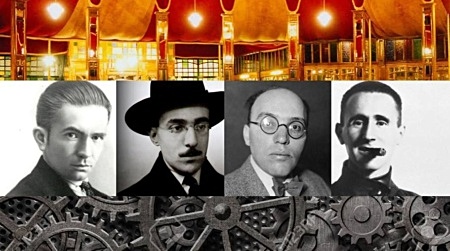
Magisch-industrieel variété met muziek, zang, magie en poëzie tijdens ‘O grote moderne geluiden’ bij het Pianolamuseum op zaterdagavond 15 april 2017
O grote moderne geluiden
Stichting Feest der Poëzie presenteert “O grote moderne geluiden” – magisch-industrieel variété met dada, futurisme, Berlijnse cabaretliederen, magie en poëzie. Verwonderaar Arjan van Vembde, klassiek liedduo Susanne Winkler en Daan van de Velde en voordrachtskunstenaar Simon Mulder brengen u in de frivole maar gevaarlijke sfeer van het begin van de vorige eeuw. Voor de pauze een Berlijns cabaret met magie en werk van o.a. Paul van Ostaijen, Bertolt Brecht en Kurt Weill, na de pauze een futuristische totaalvoordracht van Fernando Pessoa’s ‘Triomfode’ met muziek en zang. Vorig jaar een succes op Estival da Estrela in Portugal, dit jaar bij het Pianola Museum.
Brecht, Weill, Van Ostayen en Pessoa
Het programma bestaat uit liederen voor piano en sopraan van Kurt Weill op teksten van Bertolt Brecht, dadaïstische gedichten van Paul van Ostayen en als grote klapper de tot voordrachttheaterstuk met muziek en zang bewerkte Triomfode van Pessoa’s heteroniem Álvaro de Campos: een futuristische liefdesverklaring aan de zware industrie en de moderne consumptiemaatschappij.
Ewoud Kieft over oorlogsenthousiasme
Historicus Ewoud Kieft is schrijver van ‘Oorlogsenthousiasme’ over de aanloop naar de Eerste Wereldoorlog. Het boek is uitgekomen bij De Bezige Bij en werd genomineerd voor de Libris Geschiedenis Prijs. Hij komt het programma inleiden met een bespreking van de achtergrond van de gebrachte teksten in het kader van de aanloop naar en gevolgen van de Eerste Wereldoorlog.
Locatie: Pianola Museum, Westerstraat 106, Amsterdam
Datum: zaterdag 15 april
Zaal open: 20:00 uur
Aanvang: 20:30 uur
Entree: 15,- euro p.p. of 12,50 euro p.p. met korting (Stadspas, CJP, student, 65+)
Meer informatie: www.feestderpoezie.nl.
reservering via info@pianola.nl
fleursdumal.nl magazine
More in: Art & Literature News, Bertolt Brecht, DANCE & PERFORMANCE, Feest der Poëzie, Literary Events, MUSIC, Ostaijen, Paul van, Pessoa, Fernando, POETRY ARCHIVE, THEATRE

Novalis
Armenmitleid
Sag an, mein Mund, warum gab dir zum Sange
Gott Dichtergeist und süßen Wohlklang zu,
Ja wahrlich auch, daß du im hohen Drange
Den Reichen riefst aus träger, stumpfer Ruh.
Denn kann nicht Sang vom Herzen himmlisch rühren,
Hat er nicht oft vom Lasterschlaf erweckt;
Kann er die Herzen nicht am Leitband führen,
Wenn er sie aus der Dumpfheit aufgeschreckt.
Wohlauf; hört mich ihr schwelgerischen Reichen,
Hört mich doch mehr noch euren innren Ruf,
Schaut um euch her, seht Arme hülflos schleichen,
Und fühlt, daß euch ein Vater nur erschuf.
Novalis (1772 – 1801)
Gedicht: Armenmitleid
fleursdumal.nl magazine
More in: Archive M-N, Novalis, Novalis
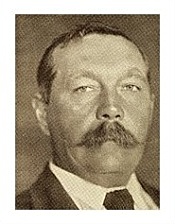 The Surgeon Talks
The Surgeon Talks
by Arthur Conan Doyle
“Men die of the diseases which they have studied most,” remarked the surgeon, snipping off the end of a cigar with all his professional neatness and finish. “It’s as if the morbid condition was an evil creature which, when it found itself closely hunted, flew at the throat of its pursuer. If you worry the microbes too much they may worry you. I’ve seen cases of it, and not necessarily in microbic diseases either. There was, of course, the well-known instance of Liston and the aneurism; and a dozen others that I could mention. You couldn’t have a clearer case than that of poor old Walker of St. Christopher’s. Not heard of it? Well, of course, it was a little before your time, but I wonder that it should have been forgotten. You youngsters are so busy in keeping up to the day that you lose a good deal that is interesting of yesterday.
“Walker was one of the best men in Europe on nervous disease. You must have read his little book on sclerosis of the posterior columns. It’s as interesting as a novel, and epoch-making in its way. He worked like a horse, did Walker—huge consulting practice—hours a day in the clinical wards—constant original investigations. And then he enjoyed himself also. ‘De mortuis,’ of course, but still it’s an open secret among all who knew him. If he died at forty-five, he crammed eighty years into it. The marvel was that he could have held on so long at the pace at which he was going. But he took it beautifully when it came.
“I was his clinical assistant at the time. Walker was lecturing on locomotor ataxia to a wardful of youngsters. He was explaining that one of the early signs of the complaint was that the patient could not put his heels together with his eyes shut without staggering. As he spoke, he suited the action to the word. I don’t suppose the boys noticed anything. I did, and so did he, though he finished his lecture without a sign.
“When it was over he came into my room and lit a cigarette.
“‘Just run over my reflexes, Smith,’ said he.
“There was hardly a trace of them left. I tapped away at his knee-tendon and might as well have tried to get a jerk out of that sofa-cushion. He stood with his eyes shut again, and he swayed like a bush in the wind.
“‘So,’ said he, ‘it was not intercostal neuralgia after all.’
“Then I knew that he had had the lightning pains, and that the case was complete. There was nothing to say, so I sat looking at him while he puffed and puffed at his cigarette. Here he was, a man in the prime of life, one of the handsomest men in London, with money, fame, social success, everything at his feet, and now, without a moment’s warning, he was told that inevitable death lay before him, a death accompanied by more refined and lingering tortures than if he were bound upon a Red Indian stake. He sat in the middle of the blue cigarette cloud with his eyes cast down, and the slightest little tightening of his lips. Then he rose with a motion of his arms, as one who throws off old thoughts and enters upon a new course.
“‘Better put this thing straight at once,’ said he. ‘I must make some fresh arrangements. May I use your paper and envelopes?’
“He settled himself at my desk and he wrote half a dozen letters. It is not a breach of confidence to say that they were not addressed to his professional brothers. Walker was a single man, which means that he was not restricted to a single woman. When he had finished, he walked out of that little room of mine, leaving every hope and ambition of his life behind him. And he might have had another year of ignorance and peace if it had not been for the chance illustration in his lecture.
“It took five years to kill him, and he stood it well. If he had ever been a little irregular he atoned for it in that long martyrdom. He kept an admirable record of his own symptoms, and worked out the eye changes more fully than has ever been done. When the ptosis got very bad he would hold his eyelid up with one hand while he wrote. Then, when he could not co-ordinate his muscles to write, he dictated to his nurse. So died, in the odour of science, James Walker, aet. 45.
“Poor old Walker was very fond of experimental surgery, and he broke ground in several directions. Between ourselves, there may have been some more ground-breaking afterwards, but he did his best for his cases. You know M’Namara, don’t you? He always wears his hair long. He lets it be understood that it comes from his artistic strain, but it is really to conceal the loss of one of his ears. Walker cut the other one off, but you must not tell Mac I said so.
“It was like this. Walker had a fad about the portio dura—the motor to the face, you know—and he thought paralysis of it came from a disturbance of the blood supply. Something else which counterbalanced that disturbance might, he thought, set it right again. We had a very obstinate case of Bell’s paralysis in the wards, and had tried it with every conceivable thing, blistering, tonics, nerve-stretching, galvanism, needles, but all without result. Walker got it into his head that removal of the ear would increase the blood supply to the part, and he very soon gained the consent of the patient to the operation.
“Well, we did it at night. Walker, of course, felt that it was something of an experiment, and did not wish too much talk about it unless it proved successful. There were half-a-dozen of us there, M’Namara and I among the rest. The room was a small one, and in the centre was in the narrow table, with a macintosh over the pillow, and a blanket which extended almost to the floor on either side. Two candles, on a side-table near the pillow, supplied all the light. In came the patient, with one side of his face as smooth as a baby’s, and the other all in a quiver with fright. He lay down, and the chloroform towel was placed over his face, while Walker threaded his needles in the candle light. The chloroformist stood at the head of the table, and M’Namara was stationed at the side to control the patient. The rest of us stood by to assist.
“Well, the man was about half over when he fell into one of those convulsive flurries which come with the semi-unconscious stage. He kicked and plunged and struck out with both hands. Over with a crash went the little table which held the candles, and in an instant we were left in total darkness. You can think what a rush and a scurry there was, one to pick up the table, one to find the matches, and some to restrain the patient who was still dashing himself about. He was held down by two dressers, the chloroform was pushed, and by the time the candles were relit, his incoherent, half-smothered shoutings had changed to a stertorous snore. His head was turned on the pillow and the towel was still kept over his face while the operation was carried through. Then the towel was withdrawn, and you can conceive our amazement when we looked upon the face of M’Namara.
“How did it happen? Why, simply enough. As the candles went over, the chloroformist had stopped for an instant and had tried to catch them. The patient, just as the light went out, had rolled off and under the table. Poor M’Namara, clinging frantically to him, had been dragged across it, and the chloroformist, feeling him there, had naturally claped the towel across his mouth and nose. The others had secured him, and the more he roared and kicked the more they drenched him with chloroform. Walker was very nice about it, and made the most handsome apologies. He offered to do a plastic on the spot, and make as good an ear as he could, but M’Namara had had enough of it. As to the patient, we found him sleeping placidly under the table, with the ends of the blanket screening him on both sides. Walker sent M’Namara round his ear next day in a jar of methylated spirit, but Mac’s wife was very angry about it, and it led to a good deal of ill-feeling.
“Some people say that the more one has to do with human nature, and the closer one is brought in contact with it, the less one thinks of it. I don’t believe that those who know most would uphold that view. My own experience is dead against it. I was brought up in the miserable-mortal-clay school of theology, and yet here I am, after thirty years of intimate acquaintance with humanity, filled with respect for it. The evil lies commonly upon the surface. The deeper strata are good. A hundred times I have seen folk condemned to death as suddenly as poor Walker was. Sometimes it was to blindness or to mutilations which are worse than death. Men and women, they almost all took it beautifully, and some with such lovely unselfishness, and with such complete absorption in the thought of how their fate would affect others, that the man about town, or the frivolously-dressed woman has seemed to change into an angel before my eyes. I have seen death-beds, too, of all ages and of all creeds and want of creeds. I never saw any of them shrink, save only one poor, imaginative young fellow, who had spent his blameless life in the strictest of sects. Of course, an exhausted frame is incapable of fear, as anyone can vouch who is told, in the midst of his sea-sickness, that the ship is going to the bottom. That is why I rate courage in the face of mutilation to be higher than courage when a wasting illness is fining away into death.
“Now, I’ll take a case which I had in my own practice last Wednesday. A lady came in to consult me—the wife of a well-known sporting baronet. The husband had come with her, but remained, at her request, in the waiting-room. I need not go into details, but it proved to be a peculiarly malignant case of cancer. ‘I knew it,’ said she. ‘How long have I to live?’ ‘I fear that it may exhaust your strength in a few months,’ I answered. ‘Poor old Jack!’ said she. ‘I’ll tell him that it is not dangerous.’ ‘Why should you deceive him?’ I asked. ‘Well, he’s very uneasy about it, and he is quaking now in the waiting-room. He has two old friends to dinner to-night, and I haven’t the heart to spoil his evening. To-morrow will be time enough for him to learn the truth.’ Out she walked, the brave little woman, and a moment later her husband, with his big, red face shining with joy came plunging into my room to shake me by the hand. No, I respected her wish and I did not undeceive him. I dare bet that evening was one of the brightest, and the next morning the darkest, of his life.
“It’s wonderful how bravely and cheerily a woman can face a crushing blow. It is different with men. A man can stand it without complaining, but it knocks him dazed and silly all the same. But the woman does not lose her wits any more than she does her courage. Now, I had a case only a few weeks ago which would show you what I mean. A gentleman consulted me about his wife, a very beautiful woman. She had a small tubercular nodule upon her upper arm, according to him. He was sure that it was of no importance, but he wanted to know whether Devonshire or the Riviera would be the better for her. I examined her and found a frightful sarcoma of the bone, hardly showing upon the surface, but involving the shoulder-blade and clavicle as well as the humerus. A more malignant case I have never seen. I sent her out of the room and I told him the truth. What did he do? Why, he walked slowly round that room with his hands behind his back, looking with the greatest interest at the pictures. I can see him now, putting up his gold pince-nez and staring at them with perfectly vacant eyes, which told me that he saw neither them nor the wall behind them. ‘Amputation of the arm?’ he asked at last. ‘And of the collar-bone and shoulder-blade,’ said I. ‘Quite so. The collar-bone and shoulder-blade,’ he repeated, still staring about him with those lifeless eyes. It settled him. I don’t believe he’ll ever be the same man again. But the woman took it as bravely and brightly as could be, and she has done very well since. The mischief was so great that the arm snapped as we drew it from the night-dress. No, I don’t think that there will be any return, and I have every hope of her recovery.
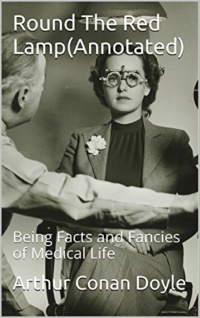 “The first patient is a thing which one remembers all one’s life. Mine was commonplace, and the details are of no interest. I had a curious visitor, however, during the first few months after my plate went up. It was an elderly woman, richly dressed, with a wickerwork picnic basket in her hand. This she opened with the tears streaming down her face, and out there waddled the fattest, ugliest, and mangiest little pug dog that I have ever seen. ‘I wish you to put him painlessly out of the world, doctor,’ she cried. ‘Quick, quick, or my resolution may give way.’ She flung herself down, with hysterical sobs, upon the sofa. The less experienced a doctor is, the higher are his notions of professional dignity, as I need not remind you, my young friend, so I was about to refuse the commission with indignation, when I bethought me that, quite apart from medicine, we were gentleman and lady, and that she had asked me to do something for her which was evidently of the greatest possible importance in her eyes. I led off the poor little doggie, therefore, and with the help of a saucerful of milk and a few drops of prussic acid his exit was as speedy and painless as could be desired. ‘Is it over?’ she cried as I entered. It was really tragic to see how all the love which should have gone to husband and children had, in default of them, been centred upon this uncouth little animal. She left, quite broken down, in her carriage, and it was only after her departure that I saw an envelope sealed with a large red seal, and lying upon the blotting pad of my desk. Outside, in pencil, was written: ‘I have no doubt that you would willingly have done this without a fee, but I insist upon your acceptance of the enclosed.’ I opened it with some vague notions of an eccentric millionaire and a fifty-pound note, but all I found was a postal order for four and sixpence. The whole incident struck me as so whimsical that I laughed until I was tired. You’ll find there’s so much tragedy in a doctor’s life, my boy, that he would not be able to stand it if it were not for the strain of comedy which comes every now and then to leaven it.
“The first patient is a thing which one remembers all one’s life. Mine was commonplace, and the details are of no interest. I had a curious visitor, however, during the first few months after my plate went up. It was an elderly woman, richly dressed, with a wickerwork picnic basket in her hand. This she opened with the tears streaming down her face, and out there waddled the fattest, ugliest, and mangiest little pug dog that I have ever seen. ‘I wish you to put him painlessly out of the world, doctor,’ she cried. ‘Quick, quick, or my resolution may give way.’ She flung herself down, with hysterical sobs, upon the sofa. The less experienced a doctor is, the higher are his notions of professional dignity, as I need not remind you, my young friend, so I was about to refuse the commission with indignation, when I bethought me that, quite apart from medicine, we were gentleman and lady, and that she had asked me to do something for her which was evidently of the greatest possible importance in her eyes. I led off the poor little doggie, therefore, and with the help of a saucerful of milk and a few drops of prussic acid his exit was as speedy and painless as could be desired. ‘Is it over?’ she cried as I entered. It was really tragic to see how all the love which should have gone to husband and children had, in default of them, been centred upon this uncouth little animal. She left, quite broken down, in her carriage, and it was only after her departure that I saw an envelope sealed with a large red seal, and lying upon the blotting pad of my desk. Outside, in pencil, was written: ‘I have no doubt that you would willingly have done this without a fee, but I insist upon your acceptance of the enclosed.’ I opened it with some vague notions of an eccentric millionaire and a fifty-pound note, but all I found was a postal order for four and sixpence. The whole incident struck me as so whimsical that I laughed until I was tired. You’ll find there’s so much tragedy in a doctor’s life, my boy, that he would not be able to stand it if it were not for the strain of comedy which comes every now and then to leaven it.
“And a doctor has very much to be thankful for also. Don’t you ever forget it. It is such a pleasure to do a little good that a man should pay for the privilege instead of being paid for it. Still, of course, he has his home to keep up and his wife and children to support. But his patients are his friends—or they should be so. He goes from house to house, and his step and his voice are loved and welcomed in each. What could a man ask for more than that? And besides, he is forced to be a good man. It is impossible for him to be anything else. How can a man spend his whole life in seeing suffering bravely borne and yet remain a hard or a vicious man? It is a noble, generous, kindly profession, and you youngsters have got to see that it remains so.”
Sir Arthur Conan Doyle (1859 – 1930)
Round the Red Lamp: Being Facts and Fancies of Medical Life
The Surgeon Talks (#15) – Last Chapter
Round the Red Lamp: Being Facts and Fancies of Medical Life
by Sir Arthur Conan Doyle
– Table of Contents
– The Preface
Behind the Times. (#01)
His First Operation. (#02)
A Straggler of ‘15. (#03)
The Third Generation. (#04)
A False Start. (#05)
The Curse of Eve. (#06)
Sweethearts. (#07)
A Physiologist’s Wife. (#08)
The Case of Lady Sannox. (#09)
A Question of Diplomacy. (#10)
A Medical Document. (#11)
Lot No. 249. (#12)
The Los Amigos Fiasco. (#13)
The Doctors of Hoyland. (#14)
The Surgeon Talks. (#15)
fleursdumal.nl magazine
More in: Doyle, Arthur Conan, Doyle, Arthur Conan, DRUGS & DISEASE & MEDICINE & LITERATURE, Round the Red Lamp
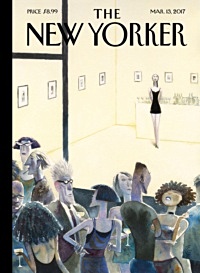 Pulitzer Prizes
Pulitzer Prizes
Pulitzer Prize administrator Mike Pride has announced today (april 10) the winners of the 2017 Pulitzer Prizes in the World Room at Columbia University in New York, N.Y.
This announcement marks the 101st year of the prizes. The Pulitzer Prizes have been awarded by Columbia University each spring since 1917.
The awards are chosen by a board of jurors for Journalism, Letters, Music and Drama.
The 2017 Winners in Letters, Drama and Music:
Fiction
The Underground Railroad by Colson Whitehead
From prize-winning, bestselling author Colson Whitehead, a magnificent tour de force chronicling a young slave’s adventures as she makes a desperate bid for freedom in the antebellum South.
 Poetry
Poetry
Olio by Tyehimba Jess
Part fact, part fiction, Tyehimba Jess’s much anticipated second book weaves sonnet, song, and narrative to examine the lives of mostly unrecorded African American performers, musicians and artists directly before and after the Civil War up to World War I. Olio is an effort to understand how they met, resisted, complicated, co-opted, and sometimes defeated attempts to minstrelize them.
History
Blood in the Water: The Atica Uprising of 1971 and Its Legacy by Heather Ann Thompson
On September 9, 1971, nearly 1,300 prisoners took over the Attica Correctional Facility in upstate New York to protest years of mistreatment. Drawing from more than a decade of extensive research, historian Heather Ann Thompson sheds new light on every aspect of the uprising and its legacy, giving voice to all those who took part in this forty-five-year fight for justice.
 Nonfiction
Nonfiction
Evicted by Matthew Desmond
Staff Pick: In this brilliant, heartbreaking book, Matthew Desmond takes us into the poorest neighborhoods of Milwaukee to tell the story of eight families on the edge.
Biography or Autobiography
The Return: Fathers, Sons and the Land in Between by Hisham Matar
The Return is at once an exquisite meditation on history, politics, and art, a brilliant portrait of a nation and a people on the cusp of change, and a disquieting depiction of the brutal legacy of absolute power. Above all, it is a universal tale of loss and love and of one family’s life.
List of all this years Pulitzer Prize winners:
Journalism
Public Service: The staff of the New York Daily News and ProPublica.
Breaking News Reporting: The staff of East Bay Times.
Investigative Reporting: Eric Eyre, the Charleston Gazette-Mail.
Explanatory Reporting: The Panama Papers, by the International Consortium of Investigative Journalists, McClatchy and the Miami Herald.
Local Reporting: The staff of The Salt Lake Tribune.
National Reporting: David Fahrenthold, The Washington Post.
International Reporting: The staff of The New York Times.
Feature Writing: C.J. Chivers of The New York Times.
Commentary: Peggy Noonan, The Wall Street Journal.
Criticism: Hilton Als, The New Yorker.
Editorial Writing: Art Cullen, The Storm Lake Times.
Editorial Cartooning: Jim Morin, Miami Herald.
Breaking News Photography: Daniel Berehulak, The New York Times.
Feature Photography: E. Jason Wambsgans, Chicago Tribune.

Letters, Drama, & Music
Fiction: The Underground Railroad, by Colson Whitehead.
Drama: Sweat, by Lynn Nottage.
History: Blood in the Water: The Attica Prison Uprising of 1971 and Its Legacy, by Heather Ann Thompson.
Biography or Autobiography: The Return, by Hisham Matar.
Poetry: Olio, by Tyehimba Jess.
General Nonfiction: Evicted: Poverty and Profit in the American City, by Matthew Desmond.
Music: Angel’s Bone, by Du Yun.
# more information on website pulitzer
fleursdumal.nl magazine
More in: - Book News, Art & Literature News, AUDIO, CINEMA, RADIO & TV, Awards & Prizes, DICTIONARY OF IDEAS, Illustrators, Illustration, MONTAIGNE, MUSIC, Photography, PRESS & PUBLISHING, REPRESSION OF WRITERS, JOURNALISTS & ARTISTS, The Art of Reading, THEATRE
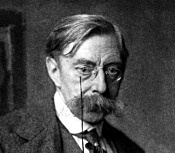
Emile Verhaeren
Mourir
Un soir plein de pourpres et de fleuves vermeils
Pourrit, par au-delà des plaines diminuées,
Et fortement, avec les poings de ses nuées,
Sur l’horizon verdâtre, écrase des soleils.
Saison massive! Et comme Octobre, avec paresse
Et nonchaloir, se gonfle et meurt dans ce décor
Pommes ! caillots de feu ; raisins ! chapelets d’or,
Que le doigté tremblant des lumières caresse,
Une dernière fois, avant l’hiver. Le vol
Des grands corbeaux ? il vient. Mais aujourd’hui, c’est l’heure
Encor des feuillaisons de laque – et la meilleure.
Les pousses des fraisiers ensanglantent le sol,
Le bois tend vers le ciel ses mains de feuilles rousses
Et du bronze et du fer sonnent, là-bas, au loin.
Une odeur d’eau se mêle à des senteurs de coing
Et des parfums d’iris à des parfums de mousses.
Et l’étang plane et clair reflète énormément
Entre de fins bouleaux, dont le branchage bouge,
La lune, qui se lève épaisse, immense et rouge,
Et semble un beau fruit mûr, éclos placidement.
Mourir ainsi, mon corps, mourir, serait le rêve!
Sous un suprême afflux de couleurs et de chants,
Avec, dans les regards, des ors et des couchants,
Avec, dans le cerveau, des rivières de sève.
Mourir! comme des fleurs trop énormes, mourir!
Trop massives et trop géantes pour la vie!
La grande mort serait superbement servie
Et notre immense orgueil n’aurait rien à souffrir!
Mourir, mon corps, ainsi que l’automne, mourir!
Emile Verhaeren (1855-1916) poésie
fleursdumal.nl magazine
More in: Archive U-V, Verhaeren, Emile

Oscar Wilde
Amor Intellectualis
Oft have we trod the vales of Castaly
And heard sweet notes of sylvan music blown
From antique reeds to common folk unknown:
And often launched our bark upon that sea
Which the nine Muses hold in empery,
And ploughed free furrows through the wave and foam,
Nor spread reluctant sail for more safe home
Till we had freighted well our argosy.
Of which despoilèd treasures these remain,
Sordello’s passion, and the honied line
Of young Endymion, lordly Tamburlaine
Driving his pampered jades, and more than these,
The seven-fold vision of the Florentine,
And grave-browed Milton’s solemn harmonies.
Oscar Wilde (1854 – 1900)
Amor Intellectualis
fleursdumal.nl magazine
More in: Archive W-X, Wilde, Oscar, Wilde, Oscar
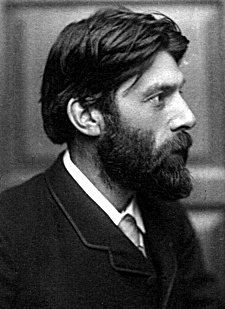
Robert Bridges
The Evening Darkens Over
The evening darkens over
After a day so bright,
The windcapt waves discover
That wild will be the night.
There’s sound of distant thunder.
The latest sea-birds hover
Along the cliff’s sheer height;
As in the memory wander
Last flutterings of delight,
White wings lost on the white.
There’s not a ship in sight;
And as the sun goes under,
Thick clouds conspire to cover
The moon that should rise yonder.
Thou art alone, fond lover
Robert Seymour Bridges (1844 – 1930)
The Evening Darkens Over
fleursdumal.nl magazine
More in: Archive A-B, Bridges, Robert
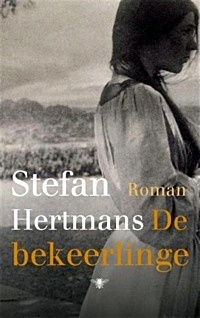 De E. du Perronprijs 2016 is toegekend aan Stefan Hertmans voor zijn roman De bekeerlinge (Uitgeverij De Bezige Bij) vanwege de kracht om tegenstrijdigheden met elkaar te verbinden en de kunst om in alles het gelijke op te zoeken. De andere genomineerden waren Rodaan Al Galidi met Hoe ik talent voor het leven kreeg (Uitgeverij Jurgen Maas) en Carolijn Visser met Selma. Aan Hitler ontsnapt, gevangene van Mao (Uitgeverij Augustus).
De E. du Perronprijs 2016 is toegekend aan Stefan Hertmans voor zijn roman De bekeerlinge (Uitgeverij De Bezige Bij) vanwege de kracht om tegenstrijdigheden met elkaar te verbinden en de kunst om in alles het gelijke op te zoeken. De andere genomineerden waren Rodaan Al Galidi met Hoe ik talent voor het leven kreeg (Uitgeverij Jurgen Maas) en Carolijn Visser met Selma. Aan Hitler ontsnapt, gevangene van Mao (Uitgeverij Augustus).
De prijs bestaat uit een geldbedrag van €2500 euro en een textiel object, ontworpen door studio ‘by aaaa’ (Moyra Besjes en Natasja Lauwers) en vervaardigd bij het TextielMuseum in Tilburg.
De uitreiking vindt plaats op donderdag 13 april, aanvang 20.00 uur bij brabants kenniscentrum voor kunst en cultuur (bkkc), Spoorlaan 21 te Tilburg.
Voorafgaand aan de uitreiking houdt schrijver Arnon Grunberg de E. du Perronlezing met als titel ‘Het paradijs’.
De E. du Perronprijs is een initiatief van de gemeente Tilburg, de School of Humanities van Tilburg University en brabants kenniscentrum voor kunst en cultuur (bkkc). In 2015 won Ilja Leonard Pfeijffer de prijs voor zijn dichtbundel Idyllen (2015), zijn pamflet Asielzoekers en zijn columns in NRC Next. Andere laureaten waren onder meer Warna Oosterbaan en Theo Baart (2015), Mohammed Benzakour (2013), Koen Peeters (2012), Ramsey Nasr (2011), Alice Boot & Rob Woortman (2010), Abdelkader Benali (2009), Adriaan van Dis (2008) en Guus Kuijer (2007).
# meer info op website tilburg university
fleursdumal.nl magazine
More in: Abdelkader Benali, Art & Literature News, Eddy du Perron, Hertmans, Stefan, Literary Events

William Shakespeare
(1564-1616)
But, soft! what light through yonder window breaks?
“But, soft! what light through yonder window breaks?
It is the east, and Juliet is the sun.
Arise, fair sun, and kill the envious moon,
Who is already sick and pale with grief,
That thou her maid art far more fair than she:
Be not her maid, since she is envious;
Her vestal livery is but sick and green
And none but fools do wear it; cast it off.
It is my lady, O, it is my love!
O, that she knew she were!
She speaks yet she says nothing: what of that?
Her eye discourses; I will answer it.
I am too bold, ’tis not to me she speaks:
Two of the fairest stars in all the heaven,
Having some business, do entreat her eyes
To twinkle in their spheres till they return.
What if her eyes were there, they in her head?
The brightness of her cheek would shame those stars,
As daylight doth a lamp; her eyes in heaven
Would through the airy region stream so bright
That birds would sing and think it were not night.
See, how she leans her cheek upon her hand!
O, that I were a glove upon that hand,
That I might touch that cheek!”
William Shakespeare, Romeo and Juliet
Shakespeare 401 (1616 – 2017)
fleursdumal.nl magazine
More in: Archive S-T, Shakespeare, William
Thank you for reading Fleurs du Mal - magazine for art & literature